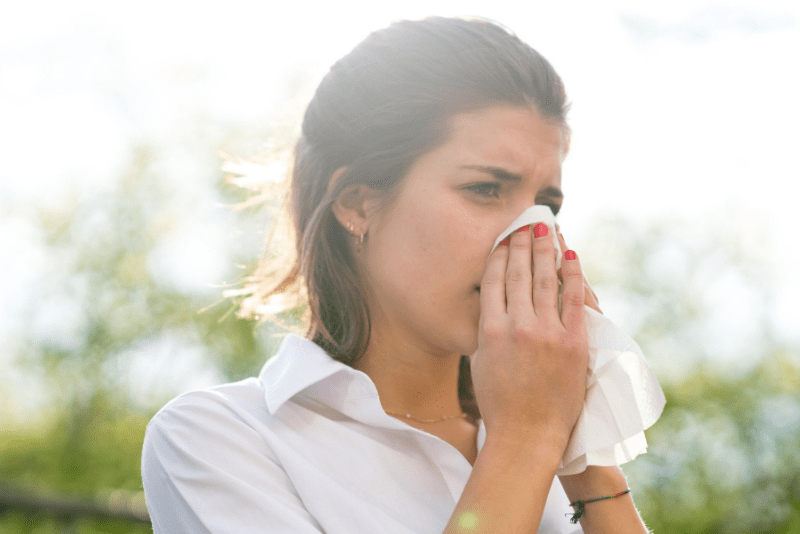From fresh cookies to family gatherings, the holidays should bring you smiles…not sniffles. However, despite all the joy and cheer in the air, many may find their stocking stuffed with the season’s most unwanted gift. No, not coal. We’re talking about winter allergies and illnesses.
Why do I get sick around the holidays?
Before we talk allergies, you should know the root causes of seasonal sickness and allergy symptoms are closely related. So, why do we tend to get sicker during the holiday season?
- We spend more time (together) indoors. When the temperature falls, we head inside. There’s no shame in this, but trouble begins when we lose access to sunlight’s Vitamin D. We sleep more and exercise less. As a result, our immune systems can weaken—coupled with the fact that we’re exposed to more indoor allergens, it’s easy to see how symptoms may flare up.
- We travel more. At home, we are the masters of our domain. We can clean to our heart’s content to dispel illness and allergens. However, holiday travel pulls us from our comfort zones and into unfamiliar environments with new germs and irritants.
- Sweet tooths can weaken our immune systems. Though tasty, try to keep sweets to a minimum when possible. Studies have shown that excessive amounts of simple sugars may slow phagocytosis (the process in which white blood cells attack illness in the body).
Seasonal Allergens, Symptoms and Solutions
While time inside allows germs and illness to spread easily, it also increases exposure to allergens like mold, pet dander and more. These irritants are present year-round, but allergy sufferers will be more susceptible to their effects thanks to closed windows and increased indoor hours. The following are common culprits of seasonal holiday symptoms.
Dust Mites
Dust mites are microscopic insect-like pests commonly found in household settings. These tiny creatures can be found in just about any room of your home and love materials such as upholstered furniture, mattresses, pillows, rugs/carpeting, etc. Dust mites are one of the most common causes of seasonal allergies.
Symptoms:
- Cough
- Sneezing
- Runny or stuffy nose
- Red, itchy or watery eyes
- Itchy nose, mouth, throat or skin
Solution: Dust mites are common but can be dealt with. Minimize exposure by washing sheets and blankets in hot water weekly (130+ degrees Fahrenheit). Purchase high quality dust mite covers for your mattress and pillow. Avoid fabrics like carpets in your home, and opt for hardwood flooring. Use a dehumidifier to eliminate the humid environment dust mites thrive in and reduce the likelihood of pesky mold (another common seasonal allergy!). Seek our allergy testing with one of our board-certified allergists to learn more about advanced therapies including immunotherapy. There are two effective forms of immunotherapy for dust mite allergies, including subcutaneous (“allergy shots”) as well as FDA-approved sublingual tablet immunotherapy.
Food Allergies
Food is a staple of the holidays. With tasty treats to share friends, it can be a dream come true for food lovers…or a nightmare for food allergy sufferers. You may be experiencing a food allergy this season if you experience the following symptoms.
Symptoms:
- Swelling of eyes, lips, tongue, throat
- Coughing, wheezing and shortness of breath
- Nausea, vomiting and diarrhea
- Light-headedness or dizziness
- Hives
Solutions: Practice safe eating this holiday season! If you are undiagnosed, begin by paying close attention to your body. Take note of the food you’ve eaten, and if symptoms start, make an appointment with your board-certified allergist to discuss the issue. Don’t be afraid to ask about ingredients in unfamiliar foods. Bring your own dish to parties to ensure you have one safe food to eat. Finally, label foods if you are playing host. This can create absolute clarity of allergy-free foods and help avoid cross-contamination between dishes. If you have a known food allergy, be sure your epinephrine auto injector is in date and carry it with you at all times.
Christmas Tree Allergies
Does your favorite tradition leave you ill? You may have discovered a new allergy. True Christmas tree allergies (fir, pine, hemlock and spruce) are rarer than most, but your symptoms may also result from other allergens clinging to the tree. Mold, pollen and even tree sap can all contribute to seasonal symptoms.
Symptoms:
- Red, itchy or watery eyes
- Runny or stuffy nose
- Coughing and/or sneezing
Solutions: The simplest solution to curb tree symptoms is switching to an artificial tree. However, if a regular tree is an absolute must, try selecting a less allergenic fir, spruce, or cypress tree. You may also locate a Leyland Cypress. These are hypoallergenic, sterile tree species meaning they do not produce pollen.
Charleston Allergy and Asthma are spreading (allergy-free) holiday cheer!
Are seasonal allergies putting a damper on your celebrations? Our team of board-certified allergists is here! Contact us today to schedule your visit and build an allergy treatment plan, including allergy testing, immunotherapy and more.




